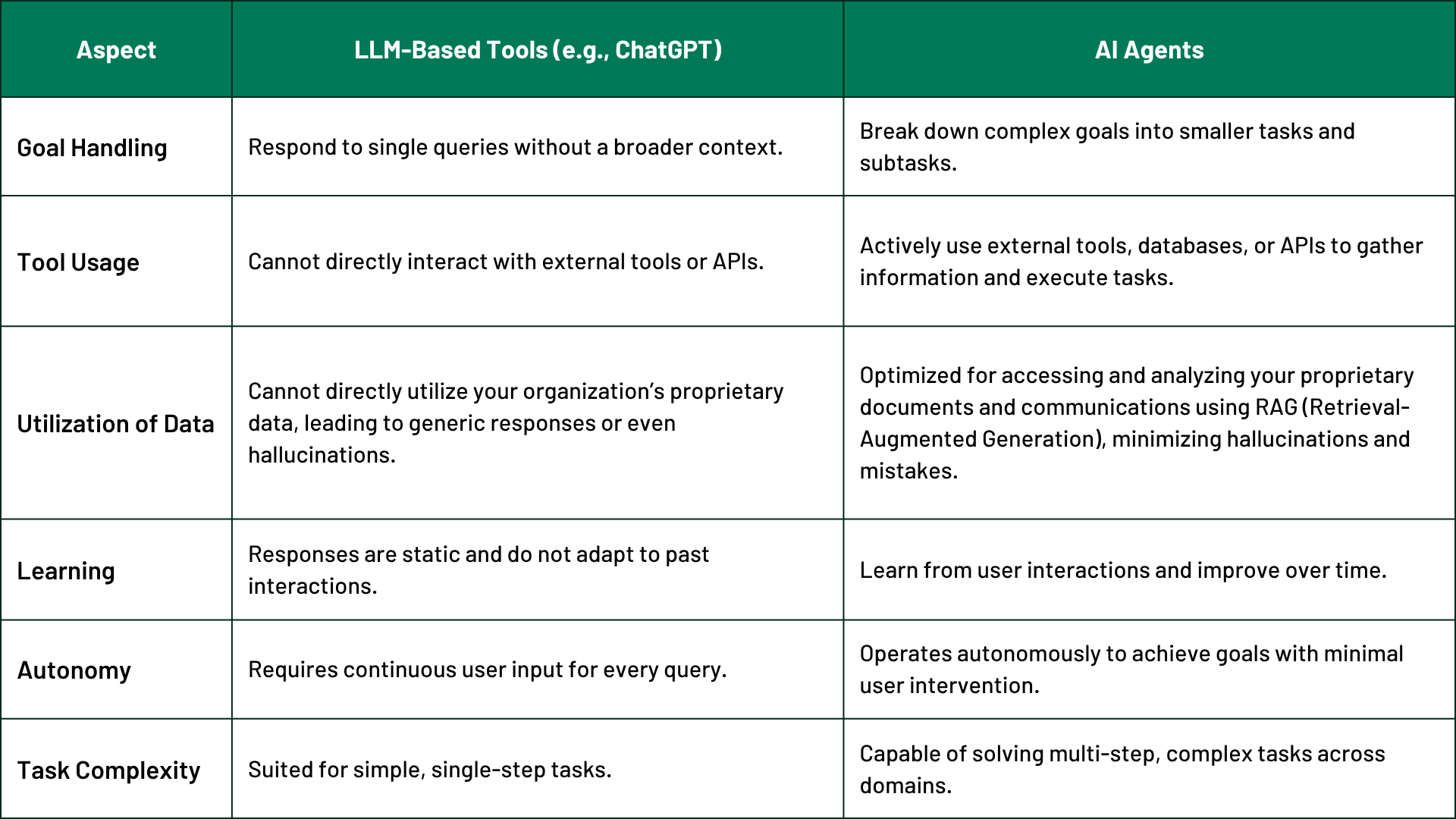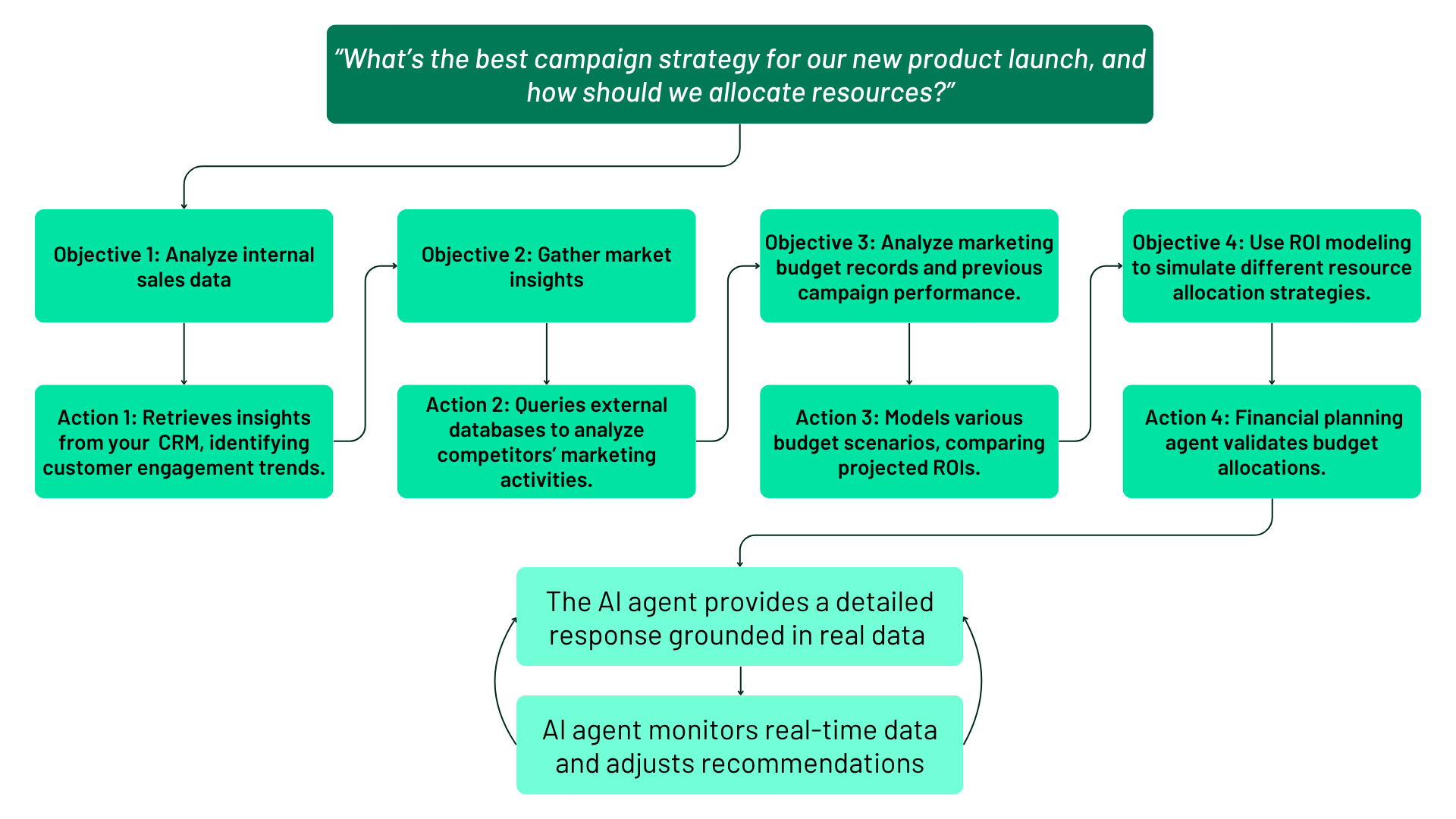.png)
“Success in applying AI isn’t about having the most sophisticated system—it’s about creating the right system for your unique needs.”
This quote from Anthropic captures the essential truth of the modern AI landscape. While competitors promote complicated (and expensive) products that can write, design, code, and generate videos, the main question persists: How does it contribute to my company’s bottom line?
In this article, we’ll explore what AI agents are, their advantages over tools like ChatGPT, and how we build them at Recursive to meet your business's unique needs.
An AI agent is an intelligent system designed to autonomously complete tasks on behalf of a user. It achieves this by breaking down goals into smaller tasks, using the right tools to accomplish these tasks, and learning and adapting over time. These agents can tackle complex challenges across various enterprise contexts, from improving customer support to accelerating drug discovery.
At their core, AI agents use the advanced natural language processing capabilities of large language models (LLMs). This allows them to understand and respond to user inputs step-by-step while deciding when to engage external tools.
However, there are key differences between how LLMs are traditionally used in tools like ChatGPT—where you ask a question and receive a single response—and how they function in an AI agent framework. To better understand these differences, let’s examine the comparison below.

Let’s say your marketing team is planning a product launch campaign and needs help developing a strategy. The query or input might be:
"What’s the best campaign strategy for our new product launch, and how should we allocate resources?"
Let’s compare how ChatGPT and an AI agent would handle this request.
1. How ChatGPT Handles It
ChatGPT provides an answer based on its training data:
"To optimize a product launch campaign, consider aligning your strategy with market trends and targeting key customer demographics. A typical allocation could be 50% to digital marketing, 30% to events, and 20% to print ads. Use analytics tools to monitor performance and adjust accordingly."
Limitations of ChatGPT:
2. How an AI Agent Handles It
An AI agent approaches the task differently. It doesn’t just generate advice—it actively solves the problem and takes action.
First, the AI agent breaks the query into smaller, actionable objectives, such as:
Then, the AI agent uses multiple tools and data sources to achieve these objectives:
Finally, after analyzing the data, the AI agent provides a detailed response:
"Based on market trends, a launch in Q2 will likely maximize engagement. Allocate 70% of your budget to digital ads targeting younger demographics, 25% to in-person events in key regions, and 5% to print ads in trade magazines. This strategy is projected to deliver a 15% higher ROI compared to historical averages."
As the campaign progresses, the AI agent monitors real-time data and adjusts recommendations. For example, if digital ads underperform, it might suggest reallocating resources to events or revising ad targeting strategies.

Unlike ChatGPT, which stops at providing generic advice, AI agents go further by taking responsibility for both generating insights and executing actions. This significantly reduces the need for human input at every step, ensures recommendations are grounded in real data, and drives effective implementation to achieve measurable results.
Leading companies like Johnson & Johnson and eBay are already recognizing the transformative power of AI agents, leveraging them to drive efficiency and innovation. In the coming years, adopting AI agents will no longer be optional—it will be a case of “adopt or be left behind.”
At Recursive, we specialize in building cutting-edge, customizable AI solutions based on our proprietary agent platform. Here’s what sets our AI agents apart from the competition:
We don’t do out of the box. Our team of top-tier machine learning engineers takes the time to understand your business’s unique challenges and leverages the best aspects of evolving technology to deliver measurable outcomes. If we haven’t moved the needle on the metrics that matter to you, we haven’t done our job.
We don’t need to start from scratch. With our agent platform, FindFlow, already pre-built, we can fine-tune it for your specific tasks and seamlessly integrate it into your business, saving valuable time.
Our agent platform is optimized for retrieving and analyzing your proprietary documents and communications using RAG (Retrieval-Augmented Generation). This reduces hallucinations and ensures the outputs are accurate and relevant.
We prioritize your data security and transparency. By running AI agents on our own cloud infrastructure, we avoid vendor lock-in, giving you full ownership of your data and fostering innovation.
Most AI agents developed in the West rely heavily on English training datasets, which can become a significant limitation for non-English-speaking companies. At Recursive, our platform is trained on both English and Japanese datasets, making it easier to fine-tune for other languages and adapt to global business needs.
If you’d like to explore examples of AI agents built by Recursive, please visit our Solutions page. For a consultation on how an AI agent can deliver measurable results for your business, feel free to contact us at sbdm@recursiveai.co.jp.
Founded by a former senior research engineer at Google DeepMind, Recursive brings together world-class talent from across disciplines to engineer results where others can't.





